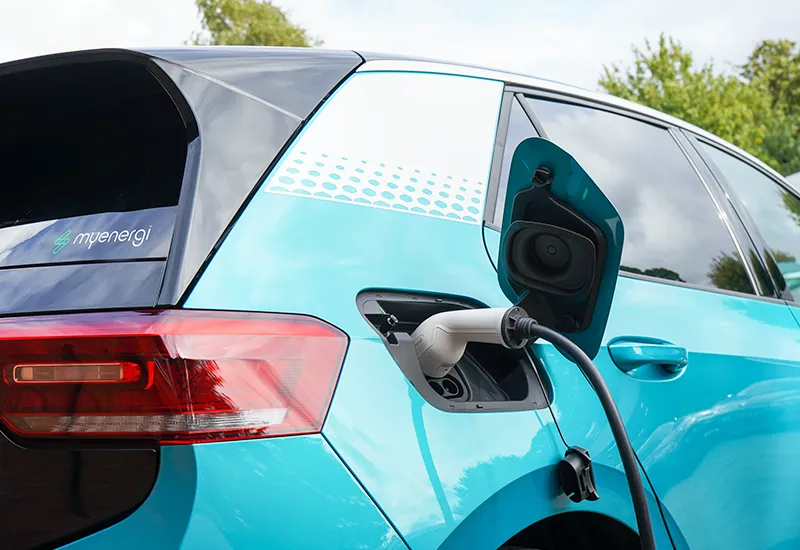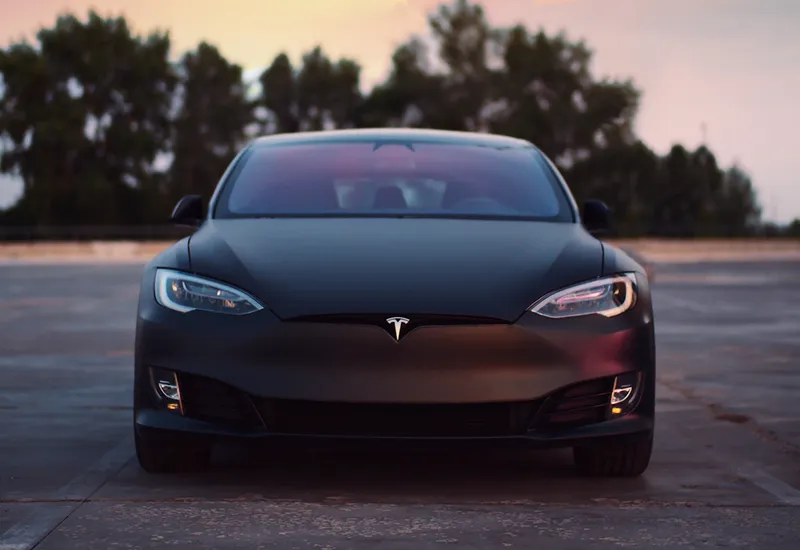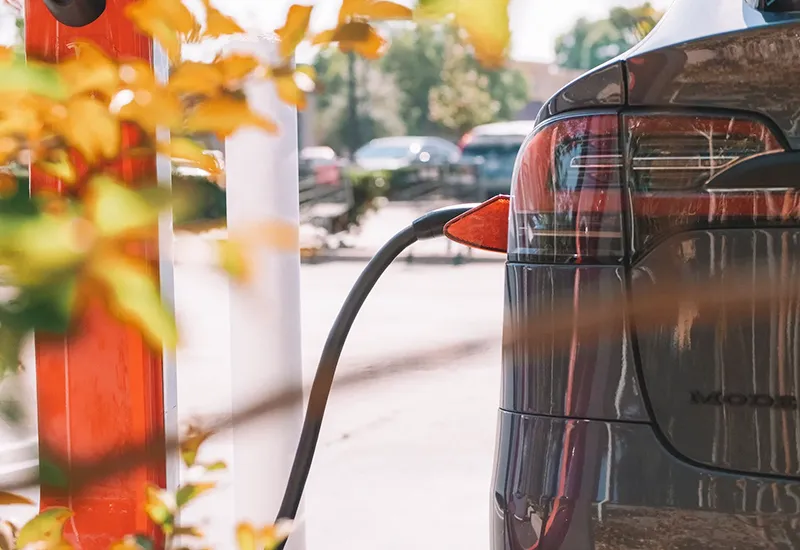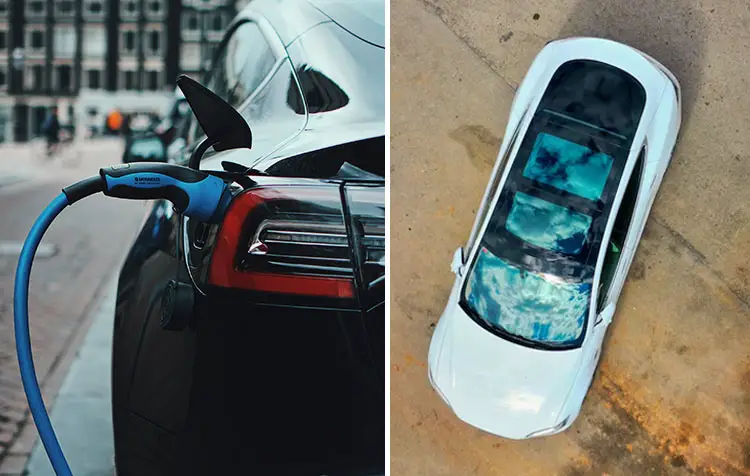What are typical prejudices against electric cars? If you're looking for an answer to this question, you've come to the right place! The e-car is a sustainable alternative to conventional gasoline or diesel cars and is becoming increasingly popular. Even though demand is growing, there are still many myths, clichés and false assumptions surrounding electromobility, which are the subject of controversial discussions and literally slow down acceptance in our society - and thus also environmental and climate protection.
With this article, I would like to counteract any possible bias, tell you the most common electric car prejudices and debunk them one by one. Let's go!
Here you can find a short overview in advance:
- Low range
- Danger and uncertainty
- Inadequate charging infrastructure
- High prices and costs
- Environmentally harmful production
- Boring appearance
- Short life and recycling of batteries
- Power grid collapse
- High tire wear
- Insufficient availability of raw materials
- Problematic cobalt extraction
- Lack of engine noise
- Job loss
- Not mature, technical development
1. "Electric cars have too short a range. They are impractical for everyday use and travel."

Electric cars are often criticized for the fact that their range is still too limited compared to conventional motor vehicles, and that not suitable for longer distances (e.g. vacation trips) is.
But on average, the range of e-cars in 2020 was already 375 kilometerswhich is absolutely sufficient for everyday trips.₁ Especially since you can (ideally) also charge at home at the wallbox.
On longer journeys, many models still require some time for charging, but this can be easily combined with a break. However, there are also fast-charging stations where the car can be recharged within 30 minutes so that it can cover a long distance again.
Some e-vehicles, such as the Mercedes EQS, can be already more than 750 kilometers at a stretch drive. In just a few years, the average range of all electric cars will be around 784 kilometers.
Don't be afraid to lie down: You also don't have to be afraid of suddenly stopping on the highway. When the power storage is almost exhausted, you receive information in good time. In addition, the e-vehicles automatically switch to energy-optimized mode.
2. "Electric cars are unsafe - mainly because of burning batteries."
Another myth surrounding the electric car is that, because the battery is ignite much faster and burst into flames - and that the fire department would have difficulty extinguishing the fire. But on the one hand have cars with gasoline or diesel engines the much more flammable fuel on board and, on the other hand, the fire intensity depends on the material of the car.
The image of electric cars on fire has only recently - and literally - "burned" into people's minds. Especially because the media outcry is particularly great when a car that is on fire happens to have an electric motor.
That this is an electric car prejudice is also confirmed by the figures. The U.S. Highway Patrol states that there are about two fires per billion miles driven for e-cars. For diesel or gasoline vehicles, the figure is 90 vehicles for the same distance.₂
3. "There are not enough public charging stations for electric cars."
The inadequate charging infrastructure is another frequently cited argument against electric cars. Many people Fear of not finding a public charging station, when they need to charge the car on the road.
But on the one hand, you can charge electric cars yourself at your own household socket. And on the other hand, there are also filling stations More and more charging stationsso that charging (and also traveling) will become even easier. Only about 2 percent of the total automotive market will be electric cars in 2023 - with a strong upward trend.₃ As market penetration increases, so will the network of charging stations.
Tip: To always have an overview and quickly find the nearest working charging station, apps such as EnBW Mobility+ or elvah help further.
4. "Electric cars are far too expensive and not affordable for the average consumer."
Critics of the electric car primarily cite its high purchase price as an argument for continuing to drive with a diesel and gasoline engine. And in fact, the prices are somewhat higher in comparison.
However, this is mainly due to the higher production costs for the batteries and will change for the better in the future (as demand grows). In addition, already today Subsidy premiums, tax benefits, which generally lower operating costs as well as the less need for maintenance of electric cars will quickly offset some of these additional costs.
Tip: You don't have to buy an e-car to drive it. You can borrow one through car-sharing services, for example, and try out the more environmentally friendly alternative to gasoline or diesel.
5. "E-cars produce more CO2 than internal combustion engines."
One of many electric car preconceptions is that manufacturing due to the batteries and necessary raw materials more harmful to the climate than conventional cars.
But fortunately, electric cars emit absolutely no climate-damaging CO2 in everyday operation over the years - unlike gasoline or diesel. However, if production does not rely on energy from renewable sources, this naturally promotes the Climate Change - but this also applies to internal combustion engines.
At the Technical University in Eindhoven, researchers have found that Electric cars already save 50 to 80 percent CO2 in comparison today.₄ Technical development will undoubtedly make them even more climate-friendly in the future. This is no longer possible with internal combustion engines.
6. "Electric cars are boring and not very pretty."

A popular prejudice against electric cars is that they are not beautiful and due to the lack of engine noise are also too boring.
But aesthetics is, of course, habit and especially Matter of taste. Even among internal combustion vehicles, there are certainly one or two cars that are considered "not particularly beautiful" in design. In addition, the number of e-models is growing steadily - and with it the range of attractive alternatives.
Men in particular often initially find the quiet sound of e-cars a thorn in the side. But that too is Matter of habit. Once you have enjoyed the many Advantages of electric cars can quickly overlook the lack of "hum" from the combustion engines.
7. "E-car batteries are short-lived and cannot be recycled."
A common misconception surrounding the e-car is also that the batteries are would only last a few years and would subsequently be electrical scrap. Just like the cell phone battery, the battery of an e-vehicle also loses capacity over time. The decisive factor is above all how often and how strongly they are charged.
However, most manufacturers are already giving a Battery warranty of eight years and 160,000 kilometers. The technology is also constantly evolving, so that even better performance can be expected in the future. The batteries are by no means electrical waste afterwards, as they are recycled in the context of Second Life Concepts can be reused as secondary storage applications.
8. "The high number of electric cars will cause the power grid to collapse."
Another typical cliché of e-mobility is that the power grid will be by charging 42 million electric cars at the same time. would be overloaded and would collapse.
But on the one hand the Power grid always further expanded and more stable - not least due to the promotion renewable energies. On the other hand Charges an average e-vehicle for only about 5 hours per week. It would be a gigantic coincidence if all e-cars were charged at the same time.₅
9. "Electric cars have higher tire wear than conventional cars."
Opponents of the electric car fear that the high torque of electric cars in combination with the often high weight, leading to enormous tire wear.
Thereby prevent the electronic traction control and the Uniform development of the torque exponential climbs and spinning wheels.₆
10. "There are far too few raw materials for electric cars."
An often-heard prejudice against electric cars is that Lithium, cobalt, graphite, platinum, nickel and rare earths are only insufficiently available and bottlenecks will therefore inevitably arise.
But experts have already given the all-clear. On the one hand, because the global raw materials for the worldwide growth of electromobility are available in sufficient quantities - on the other hand because Manufacturers:inside are driven to minimize the use of raw materials for cost reasons alone..₇
11. "E-cars require cobalt, which is extracted with the help of child labor."
One argument often mentioned in discussions about e-mobility is that it is child labor in the mining of cobalt for lithium-ion batteries comes. Although cobalt is of course also found in combustion engines, smartphones and other everyday devices, the batteries of e-cars are actually the biggest driver of demand for the controversial raw material.
However, the vehicle manufacturers are also aware of this problem - and are working on a solution in the near future. with recycled raw materials and thus manage without cobalt.₈
Tip: What each of us can do against child laborYou can learn more about this in the linked blog post.
12. "E-cars are too quiet and overlooked."
Another prejudice against electric cars is that they are difficult to hear by pedestrians and therefore a great danger. With the E-car generates namely also basically really only the rolling of the tires from a speed of about 30 km/h an audible sound.
Since 2021, newly registered electric vehicles have therefore had to be equipped with a so-called Acoustic Vehicle Alerting System (AVAS) have. This is an audible beep at lower speeds that warns passersby.
13. "The introduction of electric cars will lead to job losses."
Many people fear that the switch to electric cars could lead to an enormous loss of jobs in the automotive industry. But of course the switch to electromobility also creates new jobs - for example in the field of battery production and renewable energies.
The German Federal Association for Electromobility estimates that around 50,000 jobs would be lost globally if there were no more classic internal combustion engines. But it also reckons that there will be around 250,000 new jobs in an automotive industry that is then fit for the future.₉
14. "The technical development of electromobility is not yet mature."

Since electromobility is still in its infancy, many people fear that the development of e-cars is proceeding too quickly and hastily. Yet developed the Scottish inventor Robert Anderson already about between 1832 and 1839 the first electric vehicle.
So the idea is not new. Since gasoline and diesel vehicles are still clearly in the majority, it is merely somewhat unusual. E-cars are already suitable for everyday use - but of course still have a way to go, not least because of the steadily growing market. enormous, technical development potentialwhile internal combustion engines are already at the end of their development.
Frequently asked questions about electric cars
Are electric cars more environmentally friendly than gasoline or diesel cars?
Yes, electric cars are generally much more environmentally friendly in operation than gasoline or diesel cars. They produce no exhaust gases. In addition, the electricity is increasingly coming from renewable sources. In comparison, electric cars already save 50 to 80 percent CO2 today.
Do electric cars cost too much?
Electric cars are by all means somewhat more expensive than gasoline or diesel cars, but prices are continuously decreasing. In addition, operating costs are usually lower than for conventional cars.
Are there enough charging stations for electric cars?
There are more and more public charging stations, but not yet enoughin order to ensure nationwide coverage. However, electric cars can also loaded at home or at work which reduces dependence on public charging stations. In addition, the network of public charging stations is constantly being expanded due to increasing demand.
The future of mobility is electric
Electric cars have so many advantages over internal combustion engines. Some examples? They are quiet and do not stink, they allow "refueling" at home and are cheap to use, they run on renewable energy and counteract the Air Pollution against. What's more, as a driver:in you don't have to worry about driving bans or suddenly escalating fuel prices.
That's why it's important to clear up misconceptions and clichés and make way for the fastest possible development of e-vehicles.
"We cannot solve our problems with the same thinking we used when we created them."
Albert Einstein
In this article, I have mentioned and debunked many of the typical electric car prejudices. Most of them are already outdated and no longer true today. Do you have any questions, suggestions or other reservations about electric cars that you would like to share? Then just write me a comment.
Stay sustainable,

PS: How the Stop air pollution otherwise I'll be happy to explain this to you in the next post.
References:
₁ Statista GmbH (2020): Average range of electric vehicles in Germany from 2017 to 2025, available at https://de.statista.com/statistik/daten/studie/443614/umfrage/prognose-zur-reichweite-von-elektroautos. [24.04.2023].
₂ S. Hajek: Fact check - Do e-cars really burn more often than diesel and gasoline cars? (Accessed 14 June 2019), available at https://www.wiwo.de/unternehmen/auto/brandgefahr-spontane-selbstentzuendung-nur-ein-mythos/24457024-3.html. [24.04.2023].
₃ Statista GmbH (2023): Share of electric cars in the passenger car fleet in Germany from 2013 to 2023, available at https://de.statista.com/statistik/daten/studie/784986/umfrage/marktanteil-von-elektrofahrzeugen-in-deutschland. [24.04.2023].
₄ A. Hoekstra, M. Steinbuch; Eindhoven University of Technology (2020): Comparison of lifetime greenhouse gas emissions from electric cars with emissions from vehicles with gasoline or diesel engines, available at https://www.gruene-bundestag.de/fileadmin/media/gruenebundestag_de/themen_az/mobilitaet/pdf/200831-Studie_EAuto_versus_Verbrenner_CO2.pdf. [24.04.2023].
₅ Erdgas Südwest GmbH: 12 myths about electromobility and why they are mostly wrong (May 06, 2021), available at https://www.erdgas-suedwest.de/natuerlichzukunft/12-mythen-elektromobilitaet-falsch. [24.04.2023].
₆ J. Kratschmar: No, e-cars are not tire eaters (as of: 07/25/2022), available at https://www.auto-motor-und-sport.de/tech-zukunft/elektroauto-reifenverschleiss-wahrheit. [24.04.2023].
₇ Öko-Institut e.V. (2017): Strategies for the Sustainable Supply of Raw Materials for Electromobility, available at https://www.agora-verkehrswende.de/fileadmin/Projekte/2017/Nachhaltige_Rohstoffversorgung_Elektromobilitaet/Agora_Verkehrswende_Synthesenpapier_WEB.pdf. [24.04.2023].
₈ T. Seibt: 97 percent recycling planned (Feb. 26, 2019), available at https://www.auto-motor-und-sport.de/news/vw-salzgitter-pilotanlage-batterie-racycling-elektroauto. [24.04.2023].
₉ MAXX SOLAR & ENERGIE GmbH & Co. KG: Prejudices against electric cars, available at https://maxx-solar.de/elektroauto-blog/vorurteile-gegen-elektroautos. [24.04.2023].






